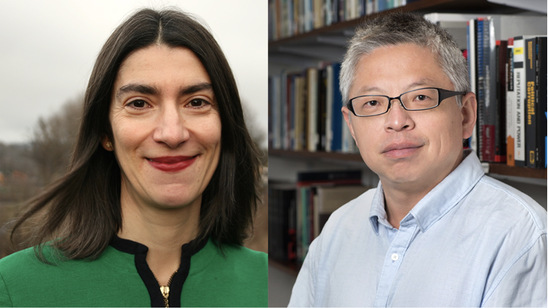Author: Release date:2023-03-01 20:21:39Source:Fudan-European Centre for China Studies (FECCS)
Climate change and global environmental issues challenge normative ideas of democracy, and nation-building seem to counteract the need to maintain global perspectives. In this open seminar, professors of philosophy Alejandra Mancilla and Tongdong Bai offer perspectives on how to reinterpret these ideas in the Post-Holocene.
Time and place:Mar. 2, 2023 1:00 PM–2:30 PM,CET (20:00-21:30 CST) on Zoom. Please click here to register for this online session.

Professor Alejandra Mancilla (left) and Professor Tongdong BAI (right).
Who is the demos when there is no one there?
Presented by Professor Alejandra Mancilla.
Despite being celebrated for promoting peace, the protection of the environment and scientific cooperation in a whole continent, some have criticized the Antarctic Treaty for lacking representativeness at the global level and have proposed ways to make it more democratic and participative. These proposals have mostly assumed that it is humans only who have interests in Antarctica, and that it is through their states that they should be represented.
While agreeing with their diagnosis, in this paper I question both the methodological nationalism and the methodological anthropocentrism underlying these approaches and ask: Should not Antarctica itself be represented? New developments in domestic and international environmental law are leading to recognize the rights of rivers, ecosystems, and other natural entities, granting them legal (and arguably, moral) standing, and assigning them their own representatives. Analogously, one could propose to have Antarctica represented too. But, if this is the way to go, who is “Antarctica”, and who should speak in its name?
To answer these questions, I review some usual candidates for determining the demos and propose that the Antarctic Treaty should be expanded to include more than the mere interests of humans in the decision-making process. I conclude by suggesting that this model should also be applied in other humanly uninhabited places and inhabited places.
How to kill three birds (strength of the state, refugee crisis, and climate change) with one stone? – A Confucianism-inspired proposal
Presented by Professor Bai Tongdong.
The present democratic and global institutions are also ill-equipped to deal with climate change, a “perfect storm” to these institutions. The impacts of climate changes tend to be long-term and are often not evenly distributed among peoples of different regions, classes, and generations, whereas democracies can be set in motion when the majority of presently living voters of a particular state feels a clear and present danger. Globally, the situation is even worse, as there is no world government even if a majority of states agrees to do something about climate change.
I will argue that Confucianism can offer institutional responses to climate challenges. Domestically, a Confucianism-inspired hybrid regime combines popular elements with meritocratic ones, and the meritocratic branch of the government may address the issue of climate change better, as it is not beholden to the short-term material interests of the majority of the presently living voters. Internationally, in a Confucianism-inspired “New Tian Xia Order,” though sovereignty and the existence of states are acknowledged, sovereignty is conditioned on a state’s fulfillment of the duty to its own people and, to a lesser extent, to the rest of the world. This offers justification for international interventions, which should be carried out by the alliances of the “civilized” states that play the role of a benevolent world police and enforces humanity’s collective duty to the protection of the environment. As an example, I will show how a state can take care of its own interests while helping peoples from troubled states through controlled migration, and this solution can avoid the exacerbation of climate change due to population boom.
About the presenters
Alejandra Mancilla
Alejandra Mancilla is professor of philosophy at the Faculty of Humanities, University of Oslo. She works on global justice, human rights, territorial rights, animal and environmental ethics. Currently, she leads the five-year project “Dynamic Territory”, aimed at rethinking territorial governance in times of climatic, geographic, and demographic change, and she is working on a book project about Antarctica and/in political theory. She is the author ofThe Right of Necessity: Moral Cosmopolitanism and Global Poverty(Rowman & Littlefield 2016). Her work has been published in theJournal of Political Philosophy, Ethics and International Affairs, Grotiana,The Journal of Applied Philosophy, andPolar Record, among others.
Tongdong Bai
Dr. Tongdong Bai is the Dongfang Chair Professor of Philosophy at Fudan University in China, and a Global Professor of Law at NYU’s Law School. His research interests include Chinese philosophy and political philosophy. He has two books published in English:China: The Political Philosophy of the Middle Kingdom(Zed Books, 2012), andAgainst Political Equality: The Confucian Case(Princeton University Press, 2019). He is now working on the philosophy of Han Fei Zi (c. 280-233 BCE), a “Legalist” and a harsh critic of Confucians, as well as a real-life princeling who is often compared with Machiavelli and Hobbes. Dr. Bai is also the director of an English-based MA and visiting program in Chinese philosophy at Fudan University that is intended to promote the studies of Chinese philosophy in the world.
About the seminar
This seminar will be an open forum on Zoom. The presenters will spend the first thirty minutes presenting their perspectives, followed by an open discussion. Participants are free and encouraged to join the discussion with their own perspectives.
Organizer
The Fudan-European Centre for China Studies